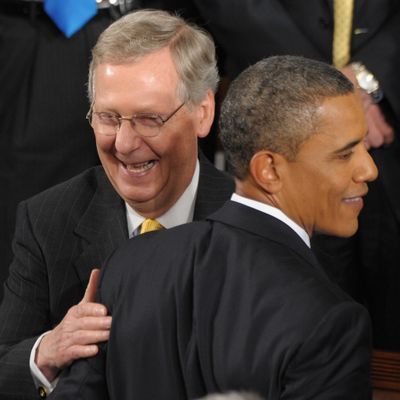
Probably the single biggest meta-argument of the presidential campaign is whether President Obama deserves to be held responsible for the economic pain Americans have felt since the start of 2009. Mitt Romney, obviously, argues that Obama deserves a great deal of blame. Here’s an illustrative statement from his spokesperson Andrea Saul:
>He [Obama] seems to forget and, I think, wants to pretend that he hasn’t been in charge the past three and a half years and that people’s current economic situations have happened on his watch,” Saul said.
Ignore the question of whether Obama’s policies helped or hindered the recovery from a disaster that clearly predated him, and instead focus on the assumption that Obama has “been in charge.” Is that really true?
Ignore the question of whether Obama’s policies helped or hindered the recovery from a disaster that clearly predated him, and instead focus on the assumption that Obama has “been in charge.” Is that really true?
As it happens, Obama has nominated Harvard economist Jeremy Stein and investment banker Jerome Powell to the Federal Reserve, which wields a great deal of power over economic policy-making, and could potentially take steps to accelerate the recovery. Despite the fact that both Stein and Powell seem designed to attract bipartisan support, Republican senators have employed a filibuster to stop their appointment from going to a vote.
So, really, is Obama in charge at all? He can’t even nominate compromise appointees to major agencies, let alone enact the plan he thinks the country needs to fight off the recession. There was a four-month period from 2009-2010 when Democrats were in charge, in the sense of having the ability to break a Republican filibuster. But that isn’t the same as Obama being in charge — it means he had the ability to pass laws that had the support of Ben Nelson and Joe Lieberman, and the time during which this was the case was so short that there were limits as to what could be done at all.
Now, there are persuasive arguments to be made that Obama has not done enough to highlight Republican obstruction or otherwise leverage his power as president. Some of those arguments are persuasive, others not. But for the most part these are arguments about how Obama could have tried to persuade other people who have their own interests to change their behavior.






























